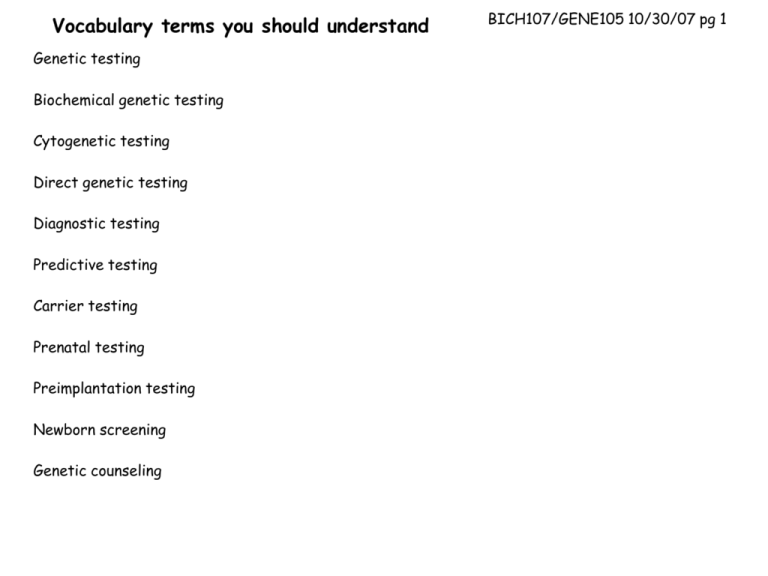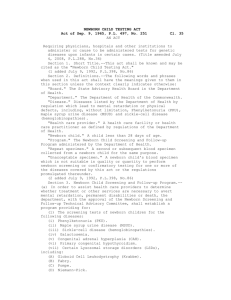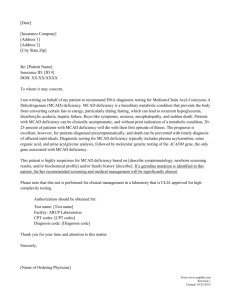genetest_handout_topost
advertisement

Vocabulary terms you should understand Genetic testing Biochemical genetic testing Cytogenetic testing Direct genetic testing Diagnostic testing Predictive testing Carrier testing Prenatal testing Preimplantation testing Newborn screening Genetic counseling BICH107/GENE105 10/30/07 pg 1 Texas Newborn Screening Quick Reference to Newborn Screening Disorders Biotinidase Deficiency - BIOT is an enzyme deficiency that occurs in about 1 in 60,000 U.S. newborns and can result in seizures, hearing loss, and death in severe cases. Treatment is simple and involves daily doses of biotin. Congenital Adrenal Hyperplasia – 21-Hydroxylase Deficiency - CAH is caused by decreased or absent production of certain adrenal hormones. The most prevalent type is detected by newborn screening in about 1 in 9,000 Texas newborns. Early detection can prevent death in boys and girls and sex misassignment in girls. Treatment involves lifelong hormone replacement therapy. Congenital Hypothyroidism Inadequate or absent production of thyroid hormone results in CH and is present in about 1 in 2,000 Texas newborns. Thyroid hormone replacement therapy begun by 1 month of age can prevent mental and growth retardation. Galactosemia – Galactose-1-Phosphate Uridyltransferase (GALT) Deficiency - Failure to metabolize the milk sugar galactose results in GAL and occurs in about 1 in 50,000 U.S. newborns. The classical form detected by newborn screening can lead to cataracts, liver cirrhosis, mental retardation and/or death. Treatment is elimination of galactose from the diet usually by substituting soy for milk products. Homocystinuria - HCY is caused by an enzyme deficiency that blocks the metabolism of an amino acid that can lead to mental retardation, osteoporosis and other problems if left undetected and untreated. The incidence is approximately 1 in 350,000 U.S. newborns. Treatment may involve a restricted protein diet and supplemental medicines, including Vitamin B6. Maple Syrup Urine Disease (MSUD) - MSUD is a defect in the way that the body metabolizes certain amino acids and is present in about 1 in 200,000 U.S. newborns. Early detection and treatment with a restricted protein diet can prevent death and severe mental retardation. There is an increased risk in Mennonites. Medium Chain Acyl-CoA Dehydrogenase (MCAD) Deficiency - The most common disorder in the way the body metabolizes fatty acids is called MCAD deficiency. Undetected, it can cause sudden death. Treatment is simple and includes ensuring frequent food intake. The incidence from newborn screening is not yet known, but is thought to be approximately 1 in 15,000 U.S. newborns. Phenylketonuria (PKU) - An enzyme defect that prevents metabolism of phenylalanine, an amino acid essential to brain development, is known as PKU and occurs in approximately 1 in every 23,000 Texas newborns. Undetected and untreated with a special restricted protein diet, PKU leads to irreversible mental retardation. Sickle Cell Disease (SCD) – includes Sickle Cell Anemia (Hb SS), Sickle Beta Thalassemia (Hb S/?Th) and Sickle-Hemoglobin C Disease (Hb S/C) - Sickle cell anemia is the most prevalent SCD and causes clogged blood vessels resulting in severe pain and other severe health problems. Newborn screening detects about 1 in 2,500 Texas newborns with SCD annually. Persons of African or Mediterranean descent are at an increased risk. Early treatment with daily penicillin prevents death in the first few years of life. Tyrosinemia Type I -TYR is caused by a deficiency in the liver of one enzyme that breaks down tyrosine. If not treated, the condition causes severe liver disease and other health problems. Treatment consists of medication including vitamin D and nitisinone, and a special restricted protein diet. Estimated incidence is 1 case in every 100,000 live births. Fatty Acid Oxidation (FAO) Disorders include Carnitine Uptake Defect (CUD), Long-Chain Hydroxyacyl-CoA Dehydrogenase Deficiency (LCHAD), Trifunctional Protein Deficiency (TFP) and Very-Long-Chain Acyl-Co A Dehydrogenase Deficiency (VLCAD) - Disorders besides MCAD deficiency, other FAO disorders may be detected through newborn screening. They are usually described in categories based on the length of the fatty acid involved. Undetected and untreated they can cause seizures, coma, and even death. Treatment may include a low fat diet, frequent food intake, supplementation with L-Carnitine (Carnitor) and medium chain triglycerides. Organic Acid (OA) Disorders include 3-Methylcrotonyl-CoA Carboxylase Deficiency (3MCC), Beta-Ketothiolase Deficiency (BKD), Glutaric Acidemia Type I (GAI), Hydroxymethylglutaric Aciduria (HMG), Isovaleric Acidemia (IVA) Methylmalonic Acidemia(MMA) (Cbl A and Cbl B forms) ( Cbl A,B), Methylmalonic Acidemia (mutase deficiency form) (MUT), Multiple Carboxylase Deficiency (MCD) and Propionic Acidemia (PROP) - Organic acidemias are a group of metabolic disorders that lead to accumulation of organic acids in the blood and urine and may be detected in newborn screening through analysis of acylcarnitine profiles. Symptoms can be diminished by restricting protein in the diet and supplementation with vitamins and/or L-Carnitine. Urea Cycle Disorders (UCD) include Argininosuccinic Acidemia (ASA) and Citrullinemia (CIT) - A UCD is a genetic disorder caused by a deficiency of one of the enzymes responsible for removing ammonia from the blood stream. Some UCDs may be detected as a part of newborn screening. They are characterized by seizures, poor muscle tone, respiratory distress, and coma, and result in death if left undetected and untreated. Treatment is by a special restricted protein diet and medications including phenylbutyrate to remove ammonia. BICH107/GENE105 10/30/07 pg 3 BICH107/GENE105 10/30/07 pg 4 What is genetic discrimination? For Thursday’s discussion, you need to investigate genetic discrimination. Here are some websites to get you started: http://www.geneticalliance.org/ws_display.asp?filter=policy.discrimination http://www.genome.gov/11510227 http://www.genome.gov/10002077








